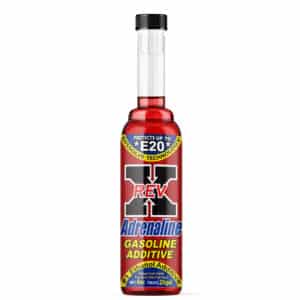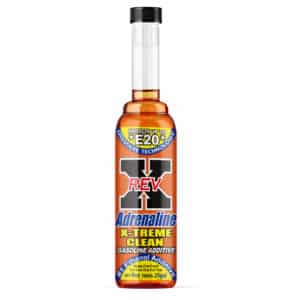REV X Adrenaline Gasoline Treatment – 2 fl. oz.
$3.95
REV X Adrenaline Gasoline Additive helps increase or restore the performance, fuel economy, and cleaning power of your regular or premium gasoline while stabilizing fuel storage up to 12 months. The added detergents work to dissolve any gum, varnish, and carbon deposits in your fuel system, including fuel injectors and intake valves with regular use. The added corrosion inhibitor helps eliminate and prevent damage caused by high ethanol content, up to E20 in trucks, cars, SUVs, lawn equipment, and small engines.
- Description
- Additional information
- Reviews (3)
- Q & A
Description
REV X Adrenaline Gasoline Additive
Adrenaline Gas Additive is an all-in-one fuel treatment to help restore and increase lost power and fuel economy. It includes an extra-strength detergent package to boost the cleaning properties of the gasoline you get at the pump. As a result, fuel treated with REV X Adrenaline has cleaning properties that exceed those found in premium gas. It will dissolve gum, varnish, and carbon deposits in carburetors, fuel injectors, fuel pumps, regulators, and fuel lines. Together with proper maintenance, this increases fuel system performance and engine response. If you do not regularly treat your fuel with a performance additive, use Adrenaline X-Treme Clean during your next fill-up.
Adrenaline’s best feature, however, is eliminating ethanol’s harmful effects up to an E20 (20%) level. Without protection, fuel systems can suffer corrosion, drying, and cracking. In particular, these effects are most often seen in soft metals, seals, delaminate fuel hoses, and damaged fuel tanks. On the positive side, damage caused by ethanol can be avoided by adding Adrenaline to the gas.
Benefits of Adrenaline Gasoline Additive
- Adrenaline increases fuel storage life by up to 12 months.
- Adrenaline deep cleans & dissolves carbon and varnish deposits.
- Increases or restores lost fuel economy and engine performance.
- It protects engines and fuel systems from ethanol issues, like corrosion.
- It works up to E20 (20% Ethanol blends), double that of most fuel treatments.
- REV X Adrenaline will not void any manufacturer’s warranties.
Why Dissolving is Better than Stripping
At some point, the fuel system in your engine will get dirty. This sludge and carbon buildup is a by-product of internal combustion engines. For this reason, most fuel additives and cleaners strip these contaminants, leaving debris to clog the filters or injectors. In the case of carbon, these large chunks of tough carbon may even cause damage to cylinder walls, pistons, and valves. Unlike other gas treatments, Adrenaline dissolves the carbon and sludge, keeping your engine running smoothly without the fear of clogging fuel filters or injectors.
Frequently Asked Questions About Ethanol
Why use Ethanol at All?
There are several reasons why ethanol is used as a fuel:- Renewable: Ethanol is produced from plant-based materials, such as corn, sugarcane, and switchgrass, which are renewable resources. This makes ethanol a more sustainable and environmentally friendly alternative to non-renewable fossil fuels.
- Domestic production: Ethanol can be produced domestically, reducing reliance on foreign oil and improving energy security.
- Cleaner burning: Ethanol burns cleaner than gasoline, producing fewer harmful emissions that contribute to air pollution and climate change.
- Octane booster: Ethanol has a high octane rating, which means it can improve engine performance and efficiency by allowing engines to run at higher compression ratios.
- Economic benefits: The production of ethanol creates jobs and supports local economies, particularly in rural areas where many of the feedstocks used to produce ethanol are grown.
Does Ethanol Decrease Fuel Mileage?
Ethanol can decrease fuel mileage when compared to gasoline alone, but the extent of the decrease can vary depending on several factors.
One of the main reasons ethanol can decrease fuel mileage is that it contains less energy per unit volume than gasoline. Specifically, ethanol has about 33% less energy per gallon than gasoline. This means that a fuel blend containing ethanol will have less energy overall, which can result in decreased fuel economy.
Another factor that can impact fuel mileage is the amount of ethanol in the fuel blend. Most gasoline sold in the United States contains up to 10% ethanol (known as E10), which typically has a negligible impact on fuel economy. However, fuels with higher ethanol content (such as E15 or E85) may result in decreased fuel mileage, as these blends contain more ethanol and less gasoline.
The type of vehicle and driving conditions can also impact fuel mileage when using ethanol blends. Some vehicles are designed to run on higher ethanol blends (such as flex-fuel vehicles), while others may experience decreased fuel economy when using blends with more ethanol. Additionally, driving conditions such as high speeds, stop-and-go traffic, and cold temperatures can also affect fuel economy, regardless of the fuel blend being used.
Overall, ethanol can decrease fuel mileage compared to gasoline, but the extent of the decrease depends on several factors, including the amount of ethanol in the fuel blend, the type of vehicle, and driving conditions.
Can Ethanol Damage Engines?
Ethanol is generally safe for use in engines designed to run on gasoline. However, there are some concerns about the potential for ethanol to cause damage to engines that are not designed to handle higher ethanol blends.
One of the main concerns is that ethanol can be corrosive to certain materials, such as rubber and plastic, which are commonly used in fuel systems. This can lead to the degradation of fuel lines, gaskets, and other components over time. However, modern fuel systems are typically designed to be compatible with ethanol blends up to 10% (E10), which is the most common blend in the United States.
Another concern is that higher ethanol blends (such as E15 or E85) may not be compatible with certain engines, particularly older engines that were not designed to run on ethanol. This is because higher ethanol blends can cause engines to run hotter, which can lead to engine damage and may also cause fuel system components to deteriorate more quickly.
Finally, there is some debate about the impact of ethanol on engine performance and durability. Some studies have suggested that ethanol can cause increased wear on engine components, while others have found no significant impact. However, most experts agree that ethanol is generally safe for use in modern engines designed to handle ethanol blends up to 10% (E10).
Overall, while there are some concerns about the potential for ethanol to cause damage to engines, ethanol is generally safe for use in engines designed to run on gasoline, particularly when used in blends of up to 10%. However, higher ethanol blends may not be compatible with certain engines, and it is important to consult your vehicle's owner's manual and follow manufacturer recommendations when using ethanol blends.
Why is Ethanol Corrosive?
Ethanol, like all alcohol, is very corrosive and hygroscopic (attracts and absorbs water from the air and its surrounding), which is not a good combination for boats or personal watercraft. High amounts of this highly corrosive mixture of water and ethanol will corrode all fuel system components not designed for it. Besides the corrosive nature of this mixture, the water increase will begin to rust out the top of gas tanks. Warm-weather climates are not immune, even though they generally do not have an issue with rust.Why Worry About Ethanol?
There are a few reasons why people worry about ethanol in gasoline:- Decreased fuel efficiency: Ethanol contains less energy than gasoline, which means that it can decrease the fuel efficiency of a vehicle. This can lead to more frequent fill-ups and increased fuel costs.
- Corrosion: Ethanol can be corrosive to certain materials, particularly those made of rubber or plastic, which are commonly found in fuel systems. This can lead to leaks, cracks, or other types of damage in the fuel system.
- Environmental concerns: While ethanol is often marketed as a renewable and environmentally-friendly fuel, there are concerns about the amount of energy required to produce it and the impact of ethanol production on land use and food prices.
- Compatibility issues: Ethanol is not compatible with all types of engines, particularly older engines or engines that were not designed to run on ethanol blends. This can lead to engine damage or other types of problems.
- Phase separation: As mentioned earlier, ethanol has a higher affinity for water than gasoline does. This can lead to phase separation, where the ethanol and water separate from the gasoline and sink to the bottom of the tank. This can cause engine problems and damage to fuel system components.
Additional information
| Weight | 3.2 oz |
|---|---|
| Dimensions | 1.25 × 1.25 × 4 in |
| Brand | REV X |
| Manufacturer | Rev X Products, Inc. |
| Size | 2 fl. oz. |
| Fuel Type | Gasoline |
| Fuel Treatment | 5 Gallons |
3 reviews for REV X Adrenaline Gasoline Treatment – 2 fl. oz.
| 5 star | 66% | |
| 4 star | 33% | |
| 3 star | 0% | |
| 2 star | 0% | |
| 1 star | 0% |
Only logged in customers who have purchased this product may leave a review.


















Robert Bruning (verified owner) –
Use this in lawn equipment..if it has a carburetor you NEED this product! Does not attack o rings or gaskets!
terry kuzman (verified owner) –
Michael Courtney (verified owner) –
Same.